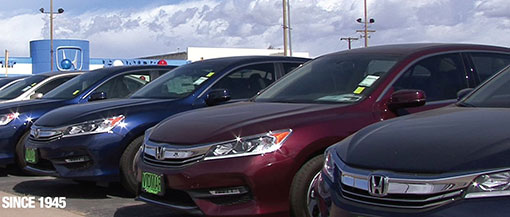
Impetus: Honda is dumping the V6 engine from the Accord, replacing with turbo-charged four
Despite its fairly vanilla existence, I’ve often held the Honda Accord in relative esteem. The first time in my life that my family got a new car, it was a 1990 Honda Accord. White, naturally, as Asian people loved cars that were either white or champagne color. It was like the coolest event in the world back then, and the Accord seemed like a spaceship compared to the dated old Toyota Celica that it had replaced.
Years later, my family ended up getting another Accord, a 1998 model. I remember this one, because I thought that the car was intended to be for me, but ultimately ended up with my dad absconding with it, when he was working away from home, out in Chattanooga for a few years, which led to a lot of sour grapes on my end. For a while, my dad drove the shit out of it before he ended up barely driving it at all, and when he traded it in a little over a year ago, the car was nearly 16 years old and never crossed the 100,000 mile mark, which for a Honda is barely half its lifespan. Along the way, my mom got a used 1994 Accord that she ran into the ground, but the point is that my family has had a lot of Honda Accords.
Ultimately, I view the Accord as a trustworthy reliable car, in spite of its vanilla existence, and if there’s one thing I’ve learned more recently, it’s the de facto car of choice for Indian families; seriously, the sheer amount of Honda Accords in my apartment complex belonging to Indian families is almost an anthropological marvel. But the Accord is a name that people associate with affordable, safe, and decently performing, and if I were at that stage of my life where I wanted a family-friendly automobile that I’d feel good about anyone driving and wouldn’t be too much of a chore for me to drive myself, the Honda Accord wouldn’t be the worst choice in the world.
Despite the fact that my family’s Accords have always been four-cylinder engines, I’ve always known that they’ve often been available with optional six-cylinder engines. Naturally, most people associate V6s with more fuel consumption, which is a justifiable and understandable concern, but I’ve always associated V6s with more power, and to most people who have ever liked cars, more power = moar fun.
Frankly, there was a time when I viewed the 2004-2008 Honda Accord Coupe as something nearing of an attainable dream car, because they came available in this gorgeous blue color, wasn’t a sedan, had a six-cylinder engine that pushed 200+ horsepower and a six-speed manual transmission. It had just about everything I was hoping to get as a next car back then, but it was also around the time in which the Honda Accord’s price tag started to inflate to numbers that my 23-year old ass couldn’t justify taking a risk on, especially with a car that still had a note on.
It’s weird to me that Honda is dumping the V6 from the Accord, and I’m not entirely sure if I like the change. I mean, I’m reluctant to accept change in the first place on just about everything, so such shouldn’t be that much of a surprise, but it just seems like an uncharacteristic change for Honda to go the direction of turbochargers versus their legacy of engineering naturally-aspirated motors that churned out stalwart numbers.
For the longest time, Honda’s reputation was creating these marvel motors that generated huge performance numbers without the need of turbos or superchargers. The vaunted Integra Type-R motor that could churn out 210 horsepower from a 1.8 liter motor at 8,500 RPM, the original Honda S2000, that generated 240 ponies out of a 2.0 liter at mind-boggling 9,000 RPM. The NSX was Honda’s supercar that pushed nearly 300 horsepower out of a naturally-aspirated engine that could compete with Porsches and Ferraris for a fraction of their prices.
Somewhere in the modus operandi was the notion that naturally-aspirated was safer for the car, which was safer for the driver, and that ultimately, forced induction power created more emissions and was less beneficial to the environment. Leave the turbos and the cheap power to the Golfs, Supras, Mitsubishis and Audis, and let us make clean, reliable high-performing cars without the need for bolt-on power. Honda was always at the forefront of green engineering, so it’s a little odd to me to see such a company-wide shift towards turbochargers.
Obviously, it’s 2017, and not 2000, when ridiculous turbos were slapped onto every riceboy Civic, with no regard to passing emissions tests or care for the environment in general. Turbos are probably more efficient, cleaner operating, and with vastly fewer of the knocks on them in general. I’d hope they’re more fuel efficient than their older counterparts, although I have to wonder if the optimal performance is still recommending premium fuel, as opposed to the lawnmower 87 that just about everyone else uses otherwise.
But it’s still weird to hear “Accord Turbo” and “stock” in the same sentence. Instead of the 3.0 liter+ V6 to get some pep in the pedal, Honda appears to be putting a 2.0 liter turbo four into their premium Accords to get power and performance for. Hell, Honda appears to be going smaller motor across the board too, seeing as how the Civic is going with a 1.5 turbo as their default engine.
One thing Honda has always been lauded for was always its reliability, but it feels like they’re taking a step backward by slapping turbos on all their cars. Inevitably, modern riceboys will be fucking with their stock turbos, trying to get moar power out of their engines, and there just feels like there’s a generation of future car problems waiting to happen by going turbos across the board.
I don’t really know, but honestly, it doesn’t really matter to me. Hondas have gotten to price points to where I don’t even really consider them anymore, and the last time I was in the market for a new car, the Hondas didn’t really wow or impress me as much as the competition, one of which I’m still driving to this day. They’ve coasted for decades on their reputation, and I guess competition is what’s making them making radical changes like turbocharging all their shit in order to keep ahead of the curve. I’m just not sure I like it, and don’t think it’s enough to pique my interest the next time I’m kicking tires for a new car.
